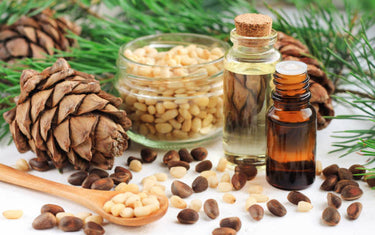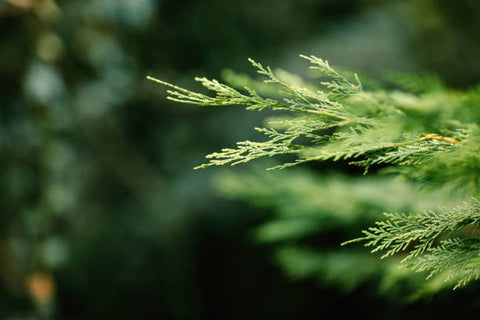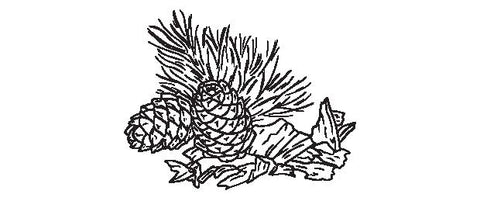8 min read / 11 December 2023 / yasmin sharp
10 Benefits and Uses of Cedarwood Oil
Cedarwood's protective qualities help to guard us against insects, coughs, and skin infections.

The lineage of cedarwood oil extends back to the times of the Ancient Egyptians, when the precious oil played an integral role in the embalming process.
Where it was once sourced from cedar trees in Lebanon, it can be found in countless countries across the world, although there are a few locations that tend to produce the best quality.
Its anti-inflammatory, antiseptic, antifungal and diuretic properties allow it to be used in an array of applications, whilst also providing aromatherapeutic comfort for anxiety and stress.
The medicinal benefits of cedarwood essential oil see it continue its long-standing association with positivity and protection and here we take a deep dive to explain more about its many health properties.
What is cedarwood oil?Extracted from the bark, leaves, needles and (occasionally) the berries of cedar trees via steam distillation, cedarwood essential oil is a deep, earthy oil sourced from many parts of the world. Whilst there are many variations of the tree, the most popular tend to be Cedarwood Virginians – which are native to North America, Virginian, Cedarwood Atlas', which can be found in the Atlas Mountains and Cedarwood Himalayans. Despite the uniquely different locations of each type of cedarwood, the properties largely remain the same, with the smell being the most distinguishing factor. |
How does cedarwood oil work?
When used medicinally, cedarwood oil addresses discomfort caused by minor ailments such as joint pain, muscle aches, coughs and poor blood circulation.
The oil can also be used as part of a hair mask to cleanse the scalp, tighten follicles, reduce thinning and boost hair growth.
As a cosmetic application, cedarwood oil can offer protection against infections, with its antibacterial, antiseptic and anti-inflammatory properties helping to improve all-round skin health.
Cedarwood is also a popular aromatherapy oil that could be effective at lowering stress levels, clear the mind, and support better sleep.

What are the benefits of cedarwood oil?
Some of the most important cedarwood oil benefits include its ability to:
1. Improve skin health
The powerful antiseptic and antimicrobial benefits of cedarwood essential oil make it ideal for treating a variety of skin conditions.
In 2017, a review of several scientific studies [1] found that these properties helped to prevent the growth of harmful microorganisms on the surface of the skin, giving it protection from damage.
It has also been noted [2] that the anti-inflammatory properties of cedarwood oil can be effective at combating acne breakouts.
Cedarwood essential oil also contains antifungal compounds that could be used to remove the spread of oral fungi.
2. Repel bugs and insects
Cedarwood oil is often used to repel bugs and insects, which is one of the reasons it was used by Ancient Egyptians as part of the embalming process.
Researchers found [3] that a component in the oil called cedrol is highly repellent to ants, whilst also discovering that it is also lethal to ticks and moth larvae.
The oil can be very effective against fully-grown moths, with cedarwood balls often used as a household remedy for reducing moths around the home.
Find out how to make your own mothballs using essential oils.
3. Improve focus and attention
According to a study at Brigham Young University, [5] inhaling cedarwood oil may be able to improve focus and attention.
The study was centred on a group of children with ADHD, and once the oil was inhaled it was noted that it had a positive effect on behaviour and focus.
Many parents also reported that the treatment continued to work at home.
Whilst additional research is needed, these findings demonstrate that cedarwood oil could be used to support other areas of cognitive medicine.
4. Ease cough symptoms
As well as being anti-inflammatory, antimicrobial and antiseptic, cedarwood oil benefits also extend to antispasmodic properties.
The oil can help to ease coughing fits that are caused by spasming muscles in the chest, helping to clear the airways to make it easier to go about your day-to-day activities.
It works in a similar way to products such as Vicks VapoRub (which contains eucalyptus).
Simply dilute a small amount of cedarwood essential oil with a carrier oil of choice and apply to the chest, before covering with a warm, dry cloth.
5. Support hair growth
There are several essential oils that have produced positive test results related to hair growth, with cedarwood often included on the list.
For example, a 1998 study [6] found that massaging cedarwood into the scalp every day for 7 months, along with a host of other essential oils such as thyme, lavender and rosemary, helped to increase hair growth in patients with alopecia areata.
In addition, the oil’s anti-inflammatory and skin-boosting properties can also be beneficial for the scalp.
Using a diluted mixture of cedarwood may be able to reduce and soothe an itchy, flaky scalp.
Alternatively, you can add 4-5 drops of the oil to a shampoo and conditioner and apply as normal.

6. Promote better sleep
Scientists looking into natural remedies to improve sleep quality have found that cedarwood may contain sedative properties.
For example, a paper published in 2003 [7] found that following inhalation, the cedrol compound had a notable effect on the restless motor activity of several rodent species.
When applied to different animal species, the oil continued to produce similar effects.
In 2018, [8] researchers investigated the effects of cedrol against anxiety.
They concluded that cedarwood oil was able to improve mood and reduce stress levels, demonstrating its potential as a natural remedy.
7. Help arthritis symptoms
The most common symptoms of arthritis include the inflammation of tissues and joints, which can cause a lot of pain and discomfort.
Using a rat model, researchers found [9] that after daily topical application, an ointment containing cedarwood and other essential oils was able to reduce the severity of these symptoms.
Whilst more research is needed to establish the full potential of cedarwood oil as an arthritic treatment, this is a method you can try at home.
Simply mix with a carrier oil and apply to painful or stiff areas, or dilute and add to warm bath water before stepping in and allowing the natural benefits of cedarwood oil to soak into the joints.
8. Work as a natural deodoriser
Cedarwood essential oil has a pleasant woody scent with an undertone of citrus. Because of this, its long-lasting aroma is regularly used as a base note in perfumery, and it is also ideal for all-natural deodorants.
It can be used to cover up body odours and as a natural air-freshener around the home, allowing you to cover up unwanted smells that may be drifting from the kitchen or bathroom, for example.
To make your own home spray, mix 15-20 drops of cedarwood essential oil with distilled water in a glass spray bottle, shake well and spritz as needed.
9. Kill fungal infections
Expanding on the small point we raised earlier, researchers have found that cedarwood oil benefits can offer protection against food poisoning and fungal pathogens.
A 2012 study [10] concluded that cedarwood oil could work as an effective alternative to antibacterial agents, whilst also helping to control some of the yeasts and bacteria responsible for oral infections.
The study also noted that the same antifungal properties could be found in clove oil, lemongrass oil, cinnamon oil and eucalyptus oil.
10. Act as a diuretic
Perhaps one of the lesser-known uses of cedarwood oil is as a diuretic, which can help to increase the amount of water in the body, whilst removing unwanted excess salt.
A paper published in 2014 found that the oil’s active compounds, which includes thujopsene, beta-cedrene and cedrol, contained natural diuretic abilities. [11]
It suggests that the benefits of cedarwood oil may allow it to increase the frequency of urination, aiding the body as it works to remove toxins and other unwanted elements.

How do you use cedarwood oil?
Cedarwood oil uses can include massage, aromatherapy, skincare, haircare and more. This gives you the option to try it:
As a bath oil
To enjoy the natural benefits of cedarwood oil in a bath, you should first dilute it using a carrier oil of choice, such as jojoba oil.
Use about 4-5 drops and mix into the water to create a relaxing environment that supports relaxation and comfort.
As a candle or soap ingredient
Cedarwood oil is a popular choice for all types of candles and soap making, with the deep bass notes lingering in the air and on the skin long after use.
It blends particularly well with bergamot, rose, rosemary and patchouli – take a look at our Make At Home page to get some more inspiration.
What is the history of cedarwood oil?
Cedar trees have maintained strong religious and spiritual connections, whilst offering symbolic meaning in the Bible for all that is abundant, fertile and strong.
Ancient Egyptians would use cedars to build sarcophagi, whilst the oil was also used to embalm pharaohs during the mummification process.
Native American and Tibetan communities would use the oil to ease the symptoms of coughs and hiccups, whilst others would burn the oil to enhance meditation practices.
Cedarwood oil was highly sought after during ancient times, with its smoky, woody scent creating a mysterious allure that made it feel even more desirable.

Cedarwood oil FAQs
Is cedarwood essential oil safe for children?
Cedarwood essential oil is safe for children aged 2 years and up, as long as a 0.5-2% dilution ratio is used.
For children with extra sensitive skin, it is advisable to decrease the dilution ratio.
Perform a patch test before using the oil on larger areas of the skin to ensure it does not trigger any irritation or allergy.
What are the risks of using cedarwood essential oil?
Like all essential oils, cedarwood is highly concentrated and should only be applied topically once a patch test has been completed.
Avoid use on sensitive parts of the body, such as the nose, lips, eyes and genitals, and if you are taking any form or prescribed medicine you should first speak with a doctor.
Is cedarwood essential oil good for nails?
Cedarwood essential oil contains antifungal and antibacterial properties that can be beneficial for combating certain types of infections, such as athlete’s foot and nail fungus.
To apply, dilute with a carrier oil and use on the affected area daily to help ease some of the symptoms.
[1] Ané Orchard et al. (2017) Commercial Essential Oils as Potential Antimicrobials to Treat Skin Diseases https://www.ncbi.nlm.nih.gov/pmc/articles/PMC5435909/
[2] Lauren A Hassoun et al. (2016) Cedarwood Oil as Complementary Treatment in Refractory Acne https://pubmed.ncbi.nlm.nih.gov/26910133/
[3] F J Eller et al. (2014) Bioactivity of cedarwood oil and cedrol against arthropod pests https://pubmed.ncbi.nlm.nih.gov/24690252/
[4] How to make moth balls with essential oils https://nikura.com/blogs/make-at-home/how-to-make-moth-balls-with-essential-oils
[5] ATTENTION DEFICIT AND HYPERACTIVITY DISORDER (ADHD) - overview (2002) https://www.semanticscholar.org/paper/ATTENTION-DEFICIT-AND-HYPERACTIVITY-DISORDER-(-ADHD/c24c35b7ceea6a3e09ea2ca773b354eea318e6c2
[6] I C Hay et al. (1998) Randomized trial of aromatherapy. Successful treatment for alopecia areata https://pubmed.ncbi.nlm.nih.gov/9828867/
[7] Daiji Kagawa et al. (2003) The sedative effects and mechanism of action of cedrol inhalation with behavioral pharmacological evaluation https://pubmed.ncbi.nlm.nih.gov/12898420/
[8] Kai Zhang et al. (2018) The anxiolytic effect of Juniperus virginiana L. essential oil and determination of its active constituents https://pubmed.ncbi.nlm.nih.gov/29326032/
[9] Steva A. Komeh-Nkrumah et al. (2011) Topical dermal application of essential oils attenuates the severity of adjuvant arthritis in Lewis rats https://www.ncbi.nlm.nih.gov/pmc/articles/PMC3168704/
[10] Lalit Kumar D Chaudhari et al. (2012) Antimicrobial activity of commercially available essential oils against Streptococcus mutans https://pubmed.ncbi.nlm.nih.gov/22430697/
[11] Hyeon-Uk Jeong et al. (2014) Inhibitory effects of cedrol, β-cedrene, and thujopsene on cytochrome P450 enzyme activities in human liver microsomes https://pubmed.ncbi.nlm.nih.gov/25343299/









